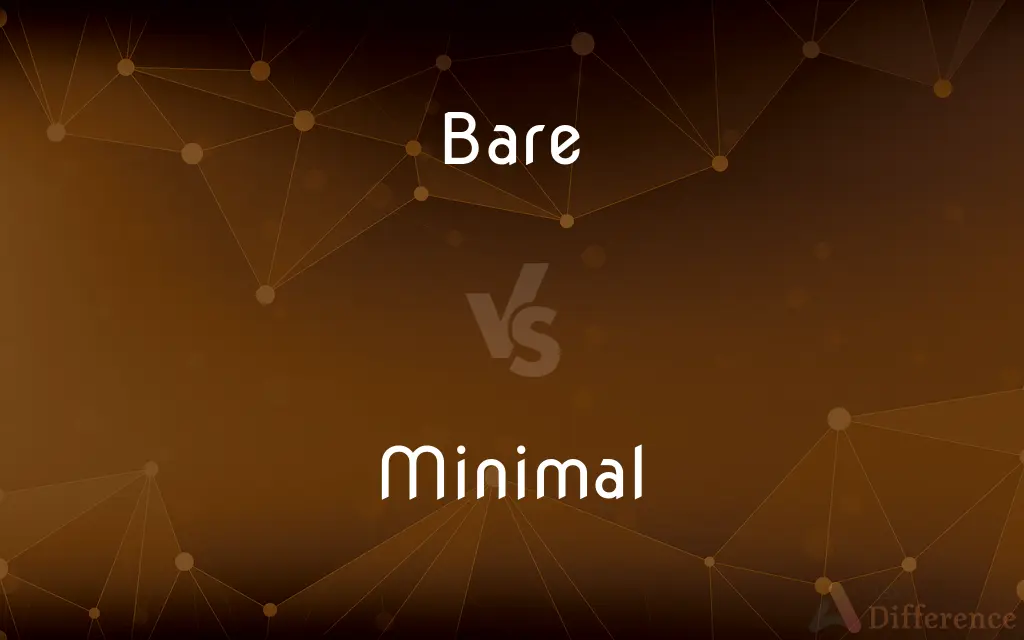Bare vs. Minimal — What's the Difference?
By Fiza Rafique & Maham Liaqat — Published on October 6, 2024
Bare focuses on the absence of additions or coverings, whereas minimal emphasizes the smallest possible amount or degree.

Difference Between Bare and Minimal
Table of Contents
ADVERTISEMENT
Key Differences
Bare often implies a lack of necessary elements or features, suggesting something is stripped down to its essentials or exposed without any adornments. For instance, a bare room might have no furniture or decorations, highlighting its emptiness or simplicity. On the other hand, minimal refers to the least amount required to achieve a specific purpose or effect. A minimal design might intentionally use very few elements to create a specific aesthetic or functional outcome, focusing on efficiency and the essence of what is needed.
While bare can convey a sense of starkness or emptiness, minimalism is often associated with deliberate simplicity and focus. A bare approach might be unintentional or due to a lack of resources, whereas minimalism is a choice to use as little as possible for maximum impact or clarity.
In terms of emotional connotation, bare can evoke feelings of vulnerability or exposure, as it often means unprotected or uncovered. Conversely, minimal can suggest control, intentionality, and a clear focus, appealing to a sense of order and simplicity.
Bare surfaces or environments might be seen as lacking or in need of something, whereas minimal settings are often viewed as intentionally pared down to essential elements, reflecting a specific design philosophy or aesthetic preference.
The choice between bare and minimal can depend on the context and the desired outcome. While bare might be used to describe a state of being without any additions, minimal is more about the conscious decision to limit what is present to only what is necessary.
ADVERTISEMENT
Comparison Chart
Definition
Lacking additions or coverings.
Involving the smallest possible amount or degree.
Connotation
Often negative, implying a lack or need.
Positive or neutral, suggesting efficiency and focus.
Intentionality
May be unintentional or due to necessity.
Reflects a deliberate choice or design principle.
Emotional Impact
Can evoke feelings of exposure or vulnerability.
Often suggests control, order, and simplicity.
Use in Design
Used to describe spaces or items without decoration.
Refers to a style that uses few elements for effect.
Compare with Definitions
Bare
Lacking covering or clothing
The trees were bare in the winter landscape.
Minimal
Employing minimalism
The design of the house was minimal yet elegant.
Bare
Without any additions or adornments
The walls of the room were bare and uninviting.
Minimal
The least possible
The artist used minimal brush strokes in his painting.
Bare
Unconcealed
His emotions were laid bare during the speech.
Minimal
Minimum amount or degree
She promised to keep the noise to a minimal level.
Bare
Exposed to view
The bare facts revealed the truth of the situation.
Minimal
Focused on essentials
The presentation was streamlined to the minimal facts necessary for understanding.
Bare
Just sufficient
They had the bare necessities for their camping trip.
Minimal
Barely adequate
They made do with minimal resources.
Bare
Having no addition, adornment, or qualification
The bare facts.
Minimal
Smallest in amount or degree
The job's minimal qualifications are a BS with two years' experience in the field.
Bare
Minimal; that is or are just sufficient.
A bare majority
Minimal
Small in amount or degree
A drug with minimal side effects.
Was able to walk with minimal discomfort.
Bare
Having no supplies.
A room bare of furniture
The cupboard was bare.
Minimal
Often Minimal Of, relating to, or being minimalism.
Bare
Just barely adequate or within a lower limit;
A bare majority
A marginal victory
Minimal
The smallest possible amount, quantity, or degree.
With minimal effort, you won't be able to achieve all your dreams.
Minimal
Of, pertaining to, or having a character of, a minim or minimum; least; smallest; as, a minimal amount or value.
Common Curiosities
How is "minimal" different from "bare"?
Minimal involves using the smallest amount or degree necessary, often with intentional simplicity, whereas bare emphasizes a lack or absence.
Is "bare" always negative?
Not always, but it often has a negative connotation, implying something is lacking or exposed.
What does "bare" mean?
Bare refers to something being exposed without coverings or adornments.
Why might someone choose a minimal design?
For its focus on essentials, efficiency, and the aesthetic of simplicity and clarity.
Can a design be both bare and minimal?
Yes, a design can be both bare and minimal if it intentionally uses few elements and lacks additional decorations.
Can "minimal" imply efficiency?
Yes, minimal often suggests efficiency by focusing on what is necessary and eliminating excess.
Does "bare" imply a natural state?
It can, as it often refers to something in its natural, uncovered state.
How do minimal and bare differ in art?
Minimal art focuses on simplicity and fundamental features, while bare might imply an absence of detail or embellishment.
How does context affect the use of "bare" vs. "minimal"?
The choice between them depends on the desired implication of lack versus intentional simplicity.
What does "bare essentials" mean?
It refers to only the most necessary elements, without any extras.
Is minimalism a trend?
Minimalism is both a longstanding design and lifestyle philosophy emphasizing simplicity and focus.
How do you achieve a minimal but warm design?
By carefully selecting a few key elements that add warmth (e.g., textures, colors) while keeping the design simple.
Can a room be minimal but not bare?
Yes, if it uses minimal elements intentionally without feeling empty or lacking.
Can minimalism help in reducing stress?
Yes, minimalism can reduce stress by eliminating clutter and focusing on what's important.
Is it possible to live a minimal lifestyle?
Yes, many people adopt minimalism to simplify their lives and focus on what truly matters.
Share Your Discovery

Previous Comparison
Dry Acid vs. Muriatic Acid
Next Comparison
Google Car vs. Regular CarAuthor Spotlight
Written by
Fiza RafiqueFiza Rafique is a skilled content writer at AskDifference.com, where she meticulously refines and enhances written pieces. Drawing from her vast editorial expertise, Fiza ensures clarity, accuracy, and precision in every article. Passionate about language, she continually seeks to elevate the quality of content for readers worldwide.
Co-written by
Maham Liaqat












































